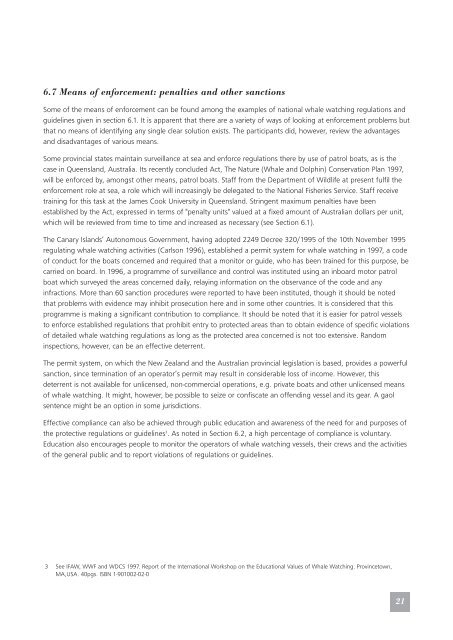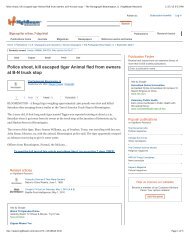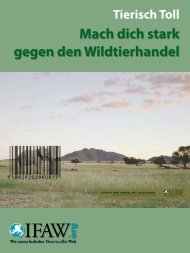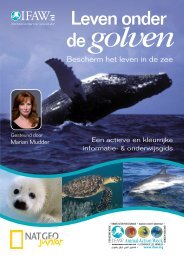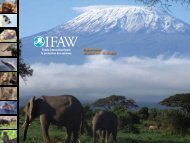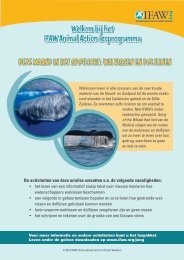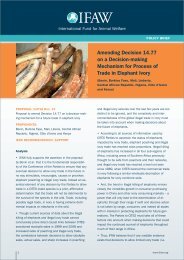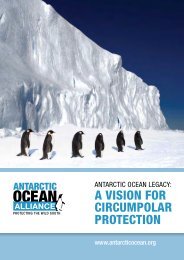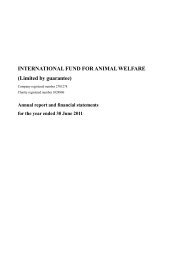leagal aspects of the whale watching.pdf - International Fund for ...
leagal aspects of the whale watching.pdf - International Fund for ...
leagal aspects of the whale watching.pdf - International Fund for ...
Create successful ePaper yourself
Turn your PDF publications into a flip-book with our unique Google optimized e-Paper software.
6.7 Means <strong>of</strong> en<strong>for</strong>cement: penalties and o<strong>the</strong>r sanctions<br />
Some <strong>of</strong> <strong>the</strong> means <strong>of</strong> en<strong>for</strong>cement can be found among <strong>the</strong> examples <strong>of</strong> national <strong>whale</strong> <strong>watching</strong> regulations and<br />
guidelines given in section 6.1. It is apparent that <strong>the</strong>re are a variety <strong>of</strong> ways <strong>of</strong> looking at en<strong>for</strong>cement problems but<br />
that no means <strong>of</strong> identifying any single clear solution exists. The participants did, however, review <strong>the</strong> advantages<br />
and disadvantages <strong>of</strong> various means.<br />
Some provincial states maintain surveillance at sea and en<strong>for</strong>ce regulations <strong>the</strong>re by use <strong>of</strong> patrol boats, as is <strong>the</strong><br />
case in Queensland, Australia. Its recently concluded Act, The Nature (Whale and Dolphin) Conservation Plan 1997,<br />
will be en<strong>for</strong>ced by, amongst o<strong>the</strong>r means, patrol boats. Staff from <strong>the</strong> Department <strong>of</strong> Wildlife at present fulfil <strong>the</strong><br />
en<strong>for</strong>cement role at sea, a role which will increasingly be delegated to <strong>the</strong> National Fisheries Service. Staff receive<br />
training <strong>for</strong> this task at <strong>the</strong> James Cook University in Queensland. Stringent maximum penalties have been<br />
established by <strong>the</strong> Act, expressed in terms <strong>of</strong> "penalty units" valued at a fixed amount <strong>of</strong> Australian dollars per unit,<br />
which will be reviewed from time to time and increased as necessary (see Section 6.1).<br />
The Canary Islands’ Autonomous Government, having adopted 2249 Decree 320/1995 <strong>of</strong> <strong>the</strong> 10th November 1995<br />
regulating <strong>whale</strong> <strong>watching</strong> activities (Carlson 1996), established a permit system <strong>for</strong> <strong>whale</strong> <strong>watching</strong> in 1997, a code<br />
<strong>of</strong> conduct <strong>for</strong> <strong>the</strong> boats concerned and required that a monitor or guide, who has been trained <strong>for</strong> this purpose, be<br />
carried on board. In 1996, a programme <strong>of</strong> surveillance and control was instituted using an inboard motor patrol<br />
boat which surveyed <strong>the</strong> areas concerned daily, relaying in<strong>for</strong>mation on <strong>the</strong> observance <strong>of</strong> <strong>the</strong> code and any<br />
infractions. More than 60 sanction procedures were reported to have been instituted, though it should be noted<br />
that problems with evidence may inhibit prosecution here and in some o<strong>the</strong>r countries. It is considered that this<br />
programme is making a significant contribution to compliance. It should be noted that it is easier <strong>for</strong> patrol vessels<br />
to en<strong>for</strong>ce established regulations that prohibit entry to protected areas than to obtain evidence <strong>of</strong> specific violations<br />
<strong>of</strong> detailed <strong>whale</strong> <strong>watching</strong> regulations as long as <strong>the</strong> protected area concerned is not too extensive. Random<br />
inspections, however, can be an effective deterrent.<br />
The permit system, on which <strong>the</strong> New Zealand and <strong>the</strong> Australian provincial legislation is based, provides a powerful<br />
sanction, since termination <strong>of</strong> an operator’s permit may result in considerable loss <strong>of</strong> income. However, this<br />
deterrent is not available <strong>for</strong> unlicensed, non-commercial operations, e.g. private boats and o<strong>the</strong>r unlicensed means<br />
<strong>of</strong> <strong>whale</strong> <strong>watching</strong>. It might, however, be possible to seize or confiscate an <strong>of</strong>fending vessel and its gear. A gaol<br />
sentence might be an option in some jurisdictions.<br />
Effective compliance can also be achieved through public education and awareness <strong>of</strong> <strong>the</strong> need <strong>for</strong> and purposes <strong>of</strong><br />
<strong>the</strong> protective regulations or guidelines 3 . As noted in Section 6.2, a high percentage <strong>of</strong> compliance is voluntary.<br />
Education also encourages people to monitor <strong>the</strong> operators <strong>of</strong> <strong>whale</strong> <strong>watching</strong> vessels, <strong>the</strong>ir crews and <strong>the</strong> activities<br />
<strong>of</strong> <strong>the</strong> general public and to report violations <strong>of</strong> regulations or guidelines.<br />
3 See IFAW, WWF and WDCS 1997. Report <strong>of</strong> <strong>the</strong> <strong>International</strong> Workshop on <strong>the</strong> Educational Values <strong>of</strong> Whale Watching. Provincetown,<br />
MA,USA. 40pgs. ISBN 1-901002-02-0<br />
21


